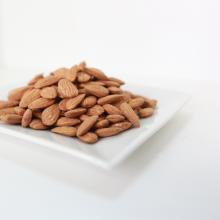We are very proud to introduce the perfect almonds to the world; Om el Fahem almonds. Our raw and natural almonds provide a healthy snack option and a fresh nutritious addition to your diet all around the year. It is known as the best almond variety with their large unique size and cherished sweet taste.
It’s called Om el Fahem almonds and (Hassan Al Assad almonds) as an attribution to the man who brought this premium seedling with him from Syria and planted it in the northern part of Palestine, and Om el Fahem is Hassan Al Assad‘s village. Once other farmers recognized how fruitful these seedlings were in addition to their sweet taste and unique large size, they began to plant it too, making this almond variety one of the best known almonds locally and internationally.
Our Palestinian almond originates in the warmth of Jenin and Toubas Governorates areas. Provided to you by cooperatives in Jenin and Toubas Governorate (Fruitful trees Cooperative, Aqqaba Cooperative, Al Yamoun Cooperative and Holy Land Agricultural Cooperative). These almonds were vastly promoted among farmers in Jenin area in the West Bank when PARC distributed thousands of seedlings in the 90’s to farmers in that area. Read about fair traded almond impact on almonds farmers here: http://alreeffairtrade.ps/sites/default/files/newsletters/almond_season_newsletter_2016.pdf
The supervision section in the Fair Trade Department provides consultations for the farmers in early stages, before the picking of almonds in order to avoid any problems that may affect the quality of almonds after the harvest. The harvest begins when the almonds become dry during August. After the picking process, the farmers remove the external crust of the almonds and dry them under sunshine to reach the required humidity level, which doesn’t allow bio organisms to grow inside the almonds after storage. Samples of almonds are tested before sending the whole amount to the cooperatives to be shelled.
After making sure that the almonds are dry enough, they get packaged and sent to the Filling Station where the workers carry out a final sorting for the almonds to remove the broken pieces. The last step involves packing the almonds in nylon bags which are placed later on into cartons.





